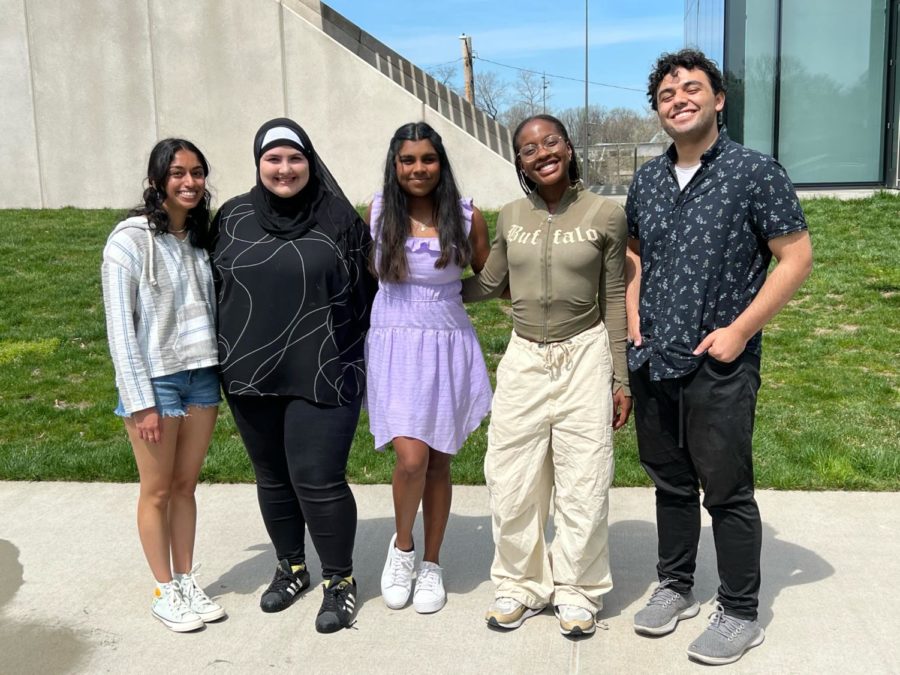Student Advocacy Group aims to create crisis support hotline
Student Advocacy Group, spearheaded by USG’s Diversity and Inclusion (DNI) committee, seeks to improve access to confidential support on campus. Members of the DNI committee pictured from left to right are first-year Shruti Kelkar, second-year Kamar Taweel, first-year Abirami Rajasekaran, first-year Chize Ogbogu and second-year Amr Salem.
Case Western Reserve University, like any other university, is unfortunately a place where sexual violence, discrimination and harassment are prevalent, with students needing plenty of support to address their crises. While CWRU does offer some resources through the Office of Equity to help students dealing with these problems ensure that proper investigation and action is taken against offenders, there are fewer resources to help students with the trauma of actually going through these experiences.
Often students don’t tell anyone in CWRU administration, or even their resident assistant, due to the fact that any CWRU employee is a mandated reporter. This means they are required to share any knowledge they have about instances of abuse or violence to the Title IX office. If a student is not sure that they want to officially start an investigation with the Title IX office, for any number of reasons, they may feel intimidated and isolated, unable to tell anyone of their predicament without escalating the situation. The Flora Stone Mather (FSM) Center for Women does have one “student advocate” who is able to provide confidential support to students without reporting, giving students the invaluable ability to voice their issues and learn more about what an official investigation into their situation may entail. While University Health Services, University Counseling Services and Cleveland Rape Crisis Center are all confidential resources available for students, the former two have been criticized for having staff unsympathetic to students at times, not following through on promised initiatives and being unable to be held accountable while the latter is an outside organization that CWRU students often hesitate to contact. This makes the student advocate all the more important. However, with only one student advocate, the availability is limited and their reach stretched thin.
Still, having access to confidential support and resources in these situations can be essential, and makes the need for more advocates evident. That’s where the Student Advocacy Group (SAG) aims to help. Starting as an initiative of the Undergraduate Student Government’s (USG) Diversity and Inclusion (DNI) committee, the SAG was first thought of as a concept to reduce the workload of the existing student advocate, Marina Giannirakis, with members of the DNI committee brainstorming ways to get students to help in the process.
Though there were proposals to scrap the DNI committee entirely this academic year, the group was able to increase its ranks and find new purpose in this endeavor. The idea they came up with, in collaboration with the FSM Center and Office of Equity, was to create a corps of volunteer student advocates who are students themselves that will be able to “provide confidential short-term crisis intervention, support, resources, and advocacy” via a hotline for students in distress. Students will be able to call a phone number to speak with a fellow student who can actively listen to them, provide support and explain the various resources available through the university.
“A big part of it was the lack of transparency with the Office of Equity,” second-year outgoing Vice President of DNI Amr Salem said. Salem will also serve on the executive board for SAG next year.
“[Students are] not aware of what the role of the Office of Equity is … Or what is the role of the student advocate, what are what is the role of the sexual assault nurse, all this kind of stuff … This initiative is basically to fill this gap between the resources that we have on campus and the students.”
After much deliberation over the legality of having students act as advocates themselves, the program was officially chartered this past month, with plans to bring it into operation over the coming academic year. With an executive board currently being selected and student volunteers being recruited, the goal is to begin training through a nationally accredited program in fall 2023 and have the hotline officially launch in spring 2024. Though launched by USG’s DNI committee, it will not be an official USG initiative in the future and instead be an independent group. So far, over 40 students have expressed interest in serving in the SAG, but the group is still looking for more.
“We are looking for people who can handle responsibility, who are passionate about advocacy and are passionate about these issues,” Salem said.
The time commitment would be about five to eight hours per week for student volunteers, and all members of SAG are strictly required to be confidential, with an internal judicial board enforcing conduct among members. Volunteers will be assigned certain cases in the short-term so that if a particular student has repeated concerns they can continue talking to the same volunteer and build that relationship. The hotline will also be available over the weekend and during the evening—days and hours which the current student advocacy system is not currently available, making the SAG more accessible for students.
“SAG is just getting started, but we have already made great strides in building a team of dedicated and compassionate advocates,” Salem commented. “We are committed to ensuring that all students feel safe and supported on our campus, and we believe that SAG will play a crucial role in achieving that goal.”

Shreyas (he/him) is a fourth-year student majoring in biology and philosophy. If he isn't yammering to you about how great "Pet Sounds" is or making bad...


